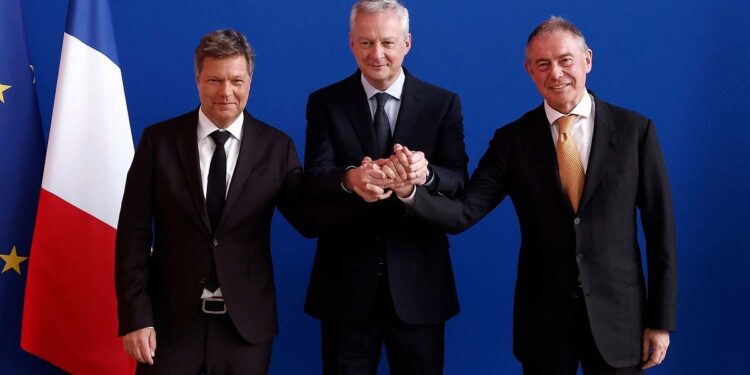The EU needs a strategy to boost its industrial competitiveness. US protectionism and Chinese interventionism force the bloc to act. At least, this is what France believes, which, alongside Germany and Italy, has outlined the main lines of the EU plan. A roadmap that, as a recommendation for the next European Commission, urges to reduce bureaucratic barriers for companies and prioritize EU companies in public procurement processes.
The meeting between the French Finance Minister, the German Economy Minister, Robert Habeck, and the Italian Industry Minister, Adolfo Urso took place this Monday in Paris. It is the fourth meeting after the meetings in Berlin, Paris, and Rome in recent months where the three major eurozone economies have outlined the pillars of a strategy to boost the industrial competitiveness of the bloc.
One of the points raised by the three countries is to eliminate unnecessary administrative burdens in order to boost business investment. That is why Paris, Berlin, and Rome have invited the European Commission to implement an ambitious bureaucratic simplification to eliminate duplications and reduce obligations for small and medium-sized enterprises.
Furthermore, they have emphasized the need to launch an investment program while promoting the integration of capital markets in the EU. The three main European economies want to accelerate the approval processes for state aid, as well as extend the temporary measures put in place following the Russian military invasion of Ukraine that relax their granting.
In addition, faced with the subsidies that both the United States and China have provided to their industry, France, Germany, and Italy have called for an increase in funding for public goods and infrastructure for green and digital transitions. It is in this context that the French Finance Minister has proposed to prefer EU companies in European public procurement.
“I wonder if we shouldn’t reserve a portion of public contracts for Made-in-Europe products or include quotas of European products in public contracts of 40%, 50%, or 60%, or impose stricter quality or environmental standards,” said Le Maire.
Habeck brought up the collateral part of such measures, which is to protect the single market from unfair competition. “Competition is good but not unfair competition,” he said. He referred to tactics such as flooding the market with products, which affects competition between local producers and third countries. Also, the need for critical infrastructures, energy, or security, to be protected.
What is evident is a change of mindset. The Italian Industry Minister described it as moving from a consumer-oriented economy to a producer-oriented economy. The former, consumer-oriented, has led to a system based on the consumption of services “that come from another continent” and that in many cases do not comply with EU rules.
The producer-oriented economy, as explained by Urso, favors the fight against unfair competition, such as dumping, subsidies, or product requirements imposed. Despite the three governments being from different political families, he indicated that they share a common vision of where the next European Commission should go, the one that will emerge from the June elections and be formed in November.
Although the US Inflation Reduction Act forced the EU to rethink its industrial competitiveness strategy, it wasn’t until 2024 that it became the main topic of the bloc’s discussions. In fact, the extraordinary summit of EU leaders that will take place at the end of April has the competitiveness strategy of the Twenty-Seven as its central point of discussion. They must rebalance their vision, adapt to the practices that both China and the United States have deployed if European companies do not want to fall behind, especially in green and digital transitions.
Paris is pushing for a rhetoric that aims to focus on the competitiveness strategy in the community debate, especially after the European elections. It’s not that Germany is very willing to rebalance trade relations at this time when its economy is not going through its optimal moment, but other EU voices are calling for measures to support the industry.


